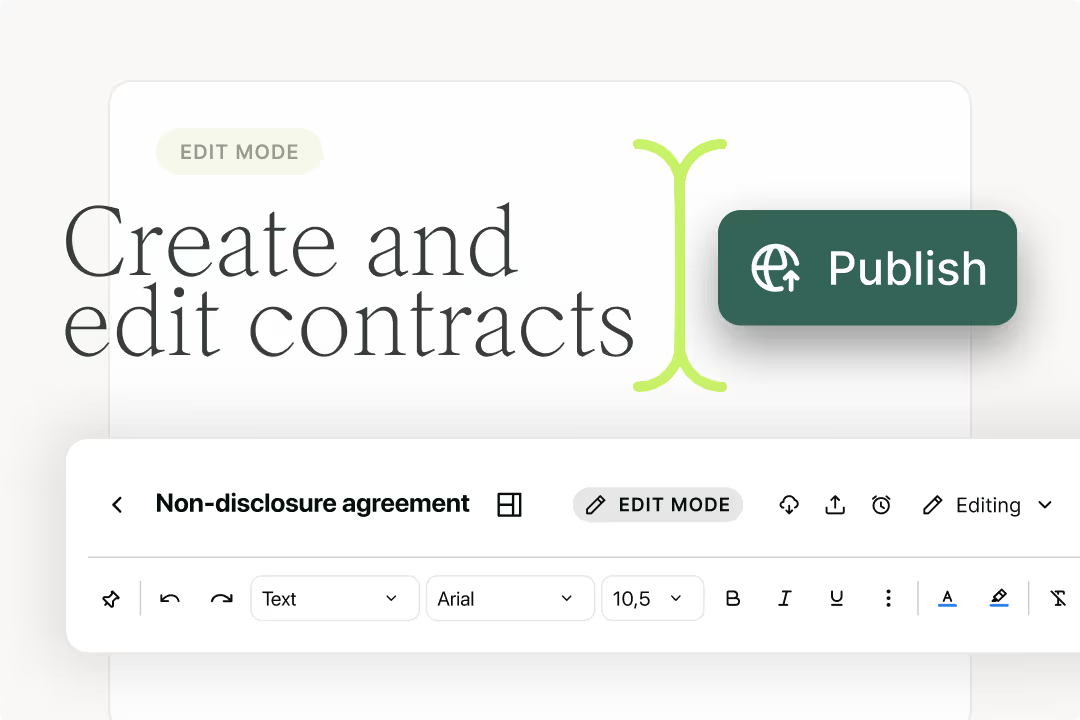Solutions
Customer Support
Resources
If you’re finding contract drafting painful, contract drafting software could be the solution. This post covers what contract drafting software is, how it works, and the benefits of adopting it for your business.
Contract drafting software is technology that businesses or individuals can use to create contracts more efficiently.
Contract drafting software offers the features legal and business teams need to draft contracts quickly and at scale without losing control of contracts and their contents.
But before we explore how contract drafting software works, let’s run through why it’s useful for fast-growing businesses.

Contract drafting software is useful because it transforms an otherwise time-consuming and manual process.
Without contract drafting software, legal and business teams are consumed by contract admin work, and the process to draft a contract looks a bit like this:
Once the contract is drafted in full it can be shared internally for contract review, usually via email. If there are any changes requested, legal will have to move back into Word and action these before sending the contract out for approval and negotiation.

Now imagine this drafting process for a business with contract volumes that are growing month on month, while the legal team stays lean. Drafting routine contracts can quickly become a huge distraction for in-house legal teams as your business grows. This takes them away from higher-value tasks.
In other businesses, commercial teams take on the task of drafting contracts themselves. While this prevents legal from becoming a blocker in sales and hiring cycles, it can be legal’s worst nightmare without the right safeguards in place.
It means legal have no control, or limited visibility, over which terms are included in a contract. This can result in higher contract risk and an increased chance of contractual disputes - both of which can be costly. Most businesses don’t have high legal risk appetite and need to keep closer control of contracts.
Fortunately, contract drafting software solves the two main problems that legal and business teams are encountering. Let’s find out how.
Contract drafting software enables commercial teams to self-serve on contracts confidently on contracts. It does this by hosting automated contract templates that have been pre-approved by in-house legal teams.
When using a tool like Juro, legal teams can create robust contract templates in an editor designed for contracts. Unlike contract templates stored as static files in Microsoft Word, these templates are dynamic, allowing legal teams to build certain rules within them.
For example, legal teams can set rules within a template so that fallback clauses are automatically added to a contract when certain conditions are met.
This is achieved using a contract drafting software feature called conditional logic. Common use cases include adding an extra clause if contracts are used across certain jurisdictions, or if they meet a certain contract value threshold.

Contract drafting software also enables legal teams to also lock their templates and restrict which sections commercial teams can edit. This is an effective way to eliminate errors and create consistency across commercial contracts.
Instead of commercial teams writing contracts, a contract drafting tool like Juro invites them to answer a few simple questions to populate a contract. This Q&A workflow uses the answers to the questions to populate any variable fields within a template and capture any important information about the parties and the transaction.
But that’s not all. Contract drafting software also enables teams to mass-create contracts rather than drafting them individually. This cuts out repetitive admin and enables teams to draft contracts at scale using bulk actions.
The most obvious benefit of adopting contract drafting software is that it saves your legal and business teams time. Contracts that previously took hours to draft can now be generated in seconds. This makes contract drafting software perfect for scaling businesses with lean legal teams as it frees up their time to focus on other, higher-value work.
{{quote1}}
Another benefit of using contract drafting software is that it empowers commercial teams to self-serve confidently on contracts by putting the right safeguards in place.
Contract drafting solutions like Juro make it quick and easy for commercial teams to generate contracts, and this means they can reduce friction by removing legal from the drafting process. This enables them to get contracts sent out and signed faster.
{{quote2}}
Contract drafting software is also a great tool for ensuring consistency and compliance when it comes to contract creation. Standardized contracts aren’t just easier to create, they’re also easier to track because the data within contracts can be captured in a consistent way.
Standardized contracts give legal and business teams confidence in their agreements because the terms used are already pre-approved and have been used time and time again.
{{quote3}}
Contract drafting software like Juro gives legal complete control over what is included in contracts and how they are drafted. This is important because legal teams are equipped with the expertise to draft contracts confidently, while commercial teams are not.
Contract drafting tools offer safeguards like structured Q&A workflows, template locking, and permission controls - all of which help to reduce contract risk. The best part is that contract drafting software gives legal teams this control over contracts without needing them to sit in the tool and oversee contracts all day.
{{quote4}}
Lastly, contract drafting software is a great solution for businesses that need to scale their contract volumes without scaling their headcount. Contract tools like Juro enable teams to mass-create and manage contracts in just a few clicks. This is especially useful for businesses creating onboarding documents, offer letters, employment contracts and contract amendments.
Contract drafting software is an effective way to streamline contract creation. But what if you want to streamline the rest of the contract lifecycle too?
Juro is an all-in-one contract automation platform that offers advanced contract drafting functionality and more.
Not only do Juro users have access to contract drafting features, but they also have access to the features needed to streamline contract review, approvals, negotiation, signing, and storage too.
Fill in the form below to find out more about how Juro enables all teams to streamline the creation, execution and management of routine contracts at scale.

Lorem ipsum dolor sit amet, consectetur adipiscing elit. Suspendisse varius enim in eros elementum tristique. Duis cursus, mi quis viverra ornare, eros dolor interdum nulla, ut commodo diam libero vitae erat. Aenean faucibus nibh et justo cursus id rutrum lorem imperdiet. Nunc ut sem vitae risus tristique posuere.

